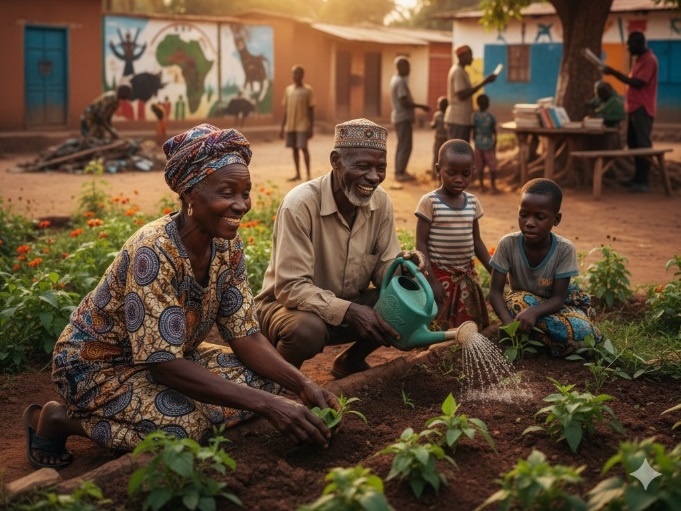Elder Volunteering Improves Memory and Thinking Skills, Study Shows
By Adebowale Bello. B.Tech Microbiology, Freelance Health Writer. Medically reviewed by the DLHA team.

An elderly African couple gardening with two young children in a sunny village setting. Image Credit: Google Gemini AI
As people grow older, one of the biggest fears they often have is losing their memory or ability to think clearly. Forgetfulness is commonly associated with aging but new research is showing that your lifestyle choices can make a difference. While eating well and exercising are important, scientists have found that volunteering and helping others can also protect the brain.
A 2025 study looked closely at how volunteering and informal helping can keep the mind sharp as you get older and the results show that lending a hand is not just good for the community but also for the brain.
The study followed 31,303 older adults—aged 51 and above—in the United States for 22 years. It focused on two main types of helping behaviours:
By tracking how often older adults engaged in these activities and comparing this with their cognitive performance, the researchers were able to see clear patterns between helping behaviours and brain health.
The findings of the study were both compelling and encouraging. Here are four main points.
Older adults who started volunteering or helping others performed better on tests of memory and thinking skills compared to those who did not.
Those who continued helping regularly over the years showed stronger and longer-lasting benefits. It was not about doing a lot at once but about steady involvement.
Spending just 2 to 4 hours a week helping others was linked to noticeable improvements. This shows that people do not need to exhaust themselves to see results.
While volunteering in organisations had benefits, everyday helping within the family or neighbourhood was equally effective.
The implications of this study are particularly relevant for African communities, where strong social ties and communal living are integral aspects of daily life. In many African cultures, helping others is a deeply ingrained value, often manifesting through activities like caring for extended family members, participating in community events and supporting neighbours in times of need.
This study reinforces the idea that these traditional practices not only strengthen social bonds but also contribute to better mental health and cognitive function. For example, an older person who regularly helps with childcare, joins community clean-up projects or supports religious activities may unknowingly be investing in their own brain health.
Moreover, the findings suggest that even small, consistent acts of helping can have significant benefits. This is encouraging, as it means that older adults do not need to undertake large-scale projects to experience cognitive improvements. Simple actions, such as assisting a neighbour with errands or volunteering a few hours a week at a local organisation, can make a meaningful difference.
This research adds to a growing body of evidence that aging well is not only about medical care but also about lifestyle and social habits. Alongside healthy eating and regular physical activity, social engagement like helping others is now recognised as a vital piece of the puzzle.
Importantly, helping others provides more than just mental benefits. It gives older adults a sense of purpose, reduces their feelings of loneliness and improves their emotional wellbeing. When people feel needed and valued, they are more motivated to stay active and positive about life.
In African societies, where community and family support systems are often robust, encouraging older adults to remain active in helping roles can be an effective public health strategy to combat cognitive decline.
Helping others is beneficial for the older adults and the society at large. Whether through formal volunteering or informal helping, older adults who give their time and effort to others enjoy better memory, sharper thinking and greater mental wellbeing. As we move forward, it is essential to recognise and promote the cognitive benefits of helping behaviours. Encouraging older adults to stay active in their communities, whether through volunteering or assisting those in need, can lead to healthier, more fulfilling lives.
Incorporating these practices into daily life not only strengthens communities but also ensures that older adults remain mentally sharp and engaged and in the end, helping others may be one of the simplest and most rewarding ways to stay mentally strong in later life.
Source: Han, S. H, Burr, J. A, & Zhang, S. (2025). Helping behaviors and cognitive function in later life: The impact of dynamic role transitions and dose changes. Social Science & Medicine, 383, 118465. Available from here
Related:
Having Positive Outlook Protects Your Memory as You Age, Study Shows
Staying Social Can Help Older Adults Live Longer, Study
10 things Africans should be doing to lower dementia risk
Published: October 8, 2025
© 2025. Datelinehealth Africa Inc. All rights reserved.
Permission is given to copy, use and share content for non-commercial purposes without alteration or modification and subject to source attribution.
DATELINEHEALTH AFRICA INC., is a digital publisher for informational and educational purposes and does not offer personal medical care and advice. If you have a medical problem needing routine or emergency attention, call your doctor or local emergency services immediately, or visit the nearest emergency room or the nearest hospital. You should consult your professional healthcare provider before starting any nutrition, diet, exercise, fitness, medical or wellness program mentioned or referenced in the DatelinehealthAfrica website. Click here for more disclaimer notice.